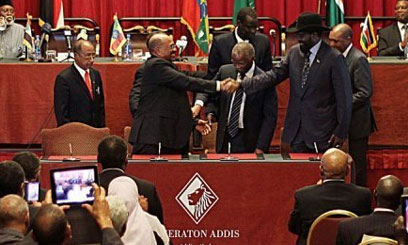South Sudan Law Society rejects bilateral cooperation deal with Sudan
October 2, 2012 (JUBA) – South Sudan Law Society (SSLS), a leading civil society organisation, on Tuesday vehemently rejected the bilateral cooperation deal signed by South Sudan and its northern neighbour on 27 September.

While the deal received international acclaim, many government officials and leading members of the major civil society organisation have expressed their concern, with some openly accusing the government of compromising the territorial rights and national sovereignty of some areas, allegedly due to being in dire and desperate economic situation.
Paul Malong Awan, governor Northern Bahr el Ghazal state, last week became the first senior government official to out rightly reject the deal, declaring that withdrawal of the armed forces from 14 Mile area south of River Kiir would only take place in his absence.
Dhieu Mathok Diing Wol, a leading member of South Sudan’s governing Sudan People’s Liberation Movement (SPLM) who comes from the area immediately offered his support to the state administration. Wol said the deal would not work because grazing corridors are never boundaries.
Majang Ngor Kuany, a former speaker of the State Assembly also added that conceding the area to Sudan means annexing it with the people living there.
Pio Tem Kuac Ngor, a former presidential advisor on border and traditional affairs on Tuesday also rejected the deal and vowed to support the state governor and citizens from the area.
Ngor, who is currently serving as an MP at the National Legislative Assembly in Juba described the deal as “problematic” and wondered whether it would be implemented without consent of the citizens.
Dong Samuel Luak, secretary of SSLS and member of the Constitution Review Committee,on Tuesday rejected the deal, describing it as “nothing” to the people of South Sudan except that it allowed for the resumption of the oil production to rescue the country from economic collapse.
“There is nothing good with this agreement. It’s just a loss game. Nothing which the government can say it has gained from the negotiations. It is just that the SPLM wants to survive. This is why it traded the land with resumption of oil production so that it continues to get money in order to remain in power”, Dong Samuel, a leading member of SSLS told Sudan Tribune on Tuesday.
He called on the nation’s citizens to get organised and challenge the deal, accusing the SPLM and negotiators of compromising the values for which generations took up arms to fight against successive Khartoum governments.
“The national sovereignty has been compromised for oil. The government has actually failed to use the strategy by late Dr.John Garang during negotiations. Late Garang bought our territorial integrity by giving away half of oil wealth because he was wise and knew very well that the issue of land was what took him to the bush,” said Luak.
He also noted that the status of Abyei is yet to be resolved, “how the pipelines became the assets of Sudan” has not been addressed and “the Sudanese army remained in contested areas.”
He also claimed that the deal allows nomadic herdsmen from Sudan to cross into South Sudan with millions of cattle to graze while “South Sudanese in the North have never been allowed to sell their own houses let alone owning land”.
(ST)
